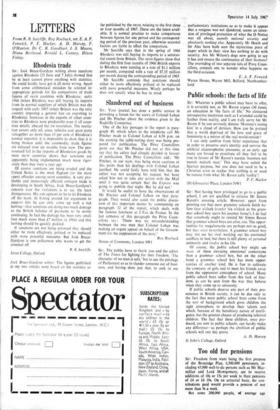Rhodesia trade
LETTERS
From R. B. Sutcliffe, Roy Roebuck, me, E. A. F. Fenwick, P. F. Hacker, A. D. Harvey, F. O'Hanlon, Dr C. B. Goodhart, 1. S. Mason, Diana Berthoud. Ronald L. Canney, Dixon Finlay.
Sir: Jock Bruce-Gardyne writing about sanctions against Rhodesia (23 June and 7 July) showed that he at least cannot prove anything with statistics. He could hardly have got it all more wrong. Apart from some arithmetical mistakes he selected in- appropriate periods for his comparisons of trade figures of OECD countries with Rhodesia: early 1966 (when Rhodesia was still buying its imports from its normal suppliers of which Britain was the largest) with early 1967 (when Britain was the only country imposing a general ban on exporting to Rhodesia). Increases in the exports of other coun- tries to Rhodesia were predictable even if all coun- tries strictly obeyed the UN resolution. The resolu- tion covers only oil, arms, vehicles and spare parts (altogether no more than 15 per cent of Rhodesia's normal imports); it is impossible to show that it is being broken until the commodity trade figures are released over six months from now. The pro- nounced fall in the imports of Rhodesian goods by most OECD countries shows that sanctions are apparently being implemented much more rigor- ously than they were a year ago.
Of course sanctions are being evaded and the United States is the most flagrant (or the most open) offender among OECD countries. A very pro- fitable and increasingly efficient entrepot trade is developing in South Africa. Jock Bruce-Gardyne's concern over the violations is to say the least disingenuous. His aim appears to be to let Rhodesia off the hook. In fishing around for arguments to support this he can only come up with a red herring—that sanctions are doing too much damage to the British balance of payments to be worth continuing. In fact the damage has been very small (not much more than £7 million in 1966) and this herring should be quickly pickled.
If sanctions are not being enforced they should either be more effectively policed or be replaced with more powerful measures. But Jock Bruce- Gardyne is one policeman who wants to get the criminal off.
Jock Bruce-Gardyne writes: The figures published in my two articles were based on the statistics so far published by the OECD, relating to the first three or four months of 1967. These are the latest avail- able. It is normal practice to make comparisons between figures for one period and the correspond- ing period of the previous year, otherwise seasonal factors are liable to affect the comparison.
Mr Sutcliffe says that in the spring of 1966 Rhodesia was still buying its imports to a substan- tial extent from Britain. The OECD figures show that during the first four months of 1966 British exports to Rhodesia were running at a rate of $1.1 million per month, compared with a rate of $7.35 million per month during the corresponding period of 1965.
Mr Sutcliffe contends that sanctions should either be more effectively policed or be replaced with more powerful measures. Wisely perhaps he does not specify what he has in mind.






























 Previous page
Previous page